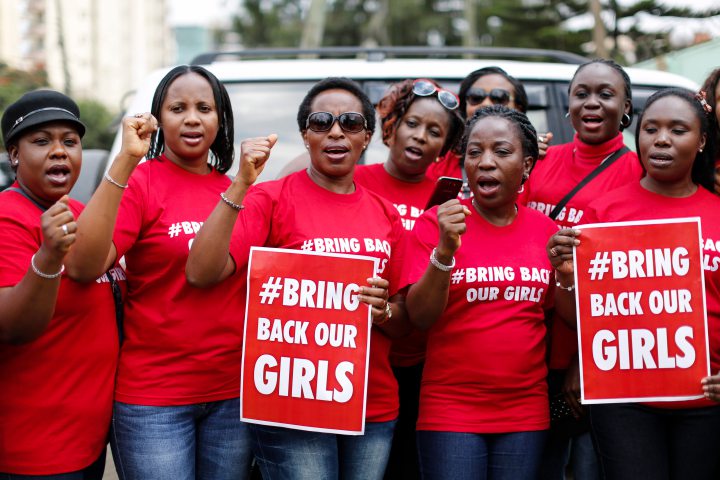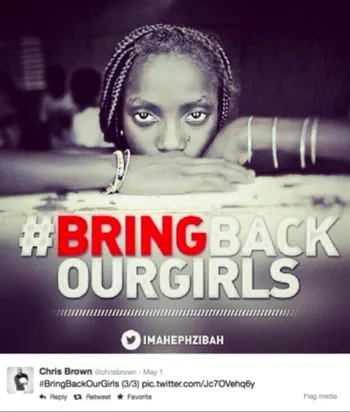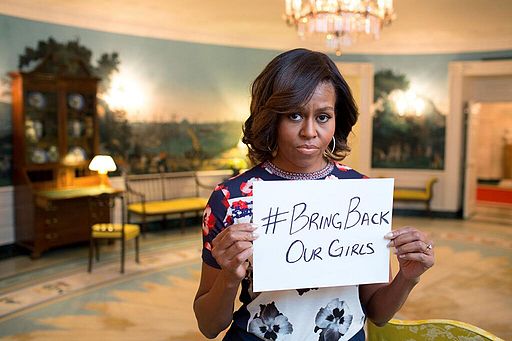If you’re reading this you have the internet, which probably means you’ve heard about the horrible abduction of 234 schoolgirls in Chibok in Borno State, Northeast Nigeria by Boko Haram. Although it’s taken off in Western media only in the last few weeks, the actual kidnapping happened on the night of April 14th. The kidnappings, the subsequent claims by the group that the girls will be trafficked as sex slaves (ie. “brides”), the protests, criticisms and terrible reaction by the government in Nigeria as well as the navel-gazing of what it means for such a story to spread in the West have all been discussed.

epa04208565 Nigerian women hold placards in front of the Nigerian High Commission during a protest against the kidnapping of the Nigerian school girls by Islamist militant group Boko Haram, in Nairobi, Kenya, 16 May 2014. Women of the Association of Nigerian Women in Kenya (ANWIK) staged a protest against slow response by Nigerian government and to demand the release of some 270 school girls who were kidnapped in Chibok in northeastern Nigeria by Boko Haram. Nigerian president Goodluck Jonathan is expected to visit the town of Chibok on 16 May, media reports say, as US surveillance drones joined the search for the kidnapped girls. EPA/DAI KUROKAWA

Most people would have encountered this through the hashtag #BringBackOurGirls, which has been deployed with aims as diverse as pressuring the Nigerian government to do more, increasing the attention of Western media and even urging for a US-led military intervention.
Whenever a humanitarian atrocity goes viral and people don’t know anything about it before they see it on social media, it’s important to tread very carefully so as not to engage in harmful misinformation or even make things actively worse. Especially when it’s a story from Africa, which is a continent the international community (that’s us!) is really ignorant about. But of course you knew that from #Kony2012, didntcha? I have a post about it too.
So, as always, I recommend getting some background before retweeting, signing petitions, advocating for particular solutions. Here are four useful posts to start with:
Atane: Everyone Is an Expert on Nigeria Now
Highlight quotes:
- [O]ne of the most disgusting things I read was from someone going on about “Nigerian culture”. This person went on to say that this is normal in Nigeria…Your lies and distortion has an affect on public perception and day to day life. Ignorant people also imbibe this nonsense and it will shape their beliefs and ideology about people they don’t know and places they have never been.
- I am choking on the paternalism from people who have declared that no one is reporting this story. A story just isn’t a story for them until someone in the western press commandeers it…Nigeria has a population hovering around 175 million and people are talking about the press in the UK not reporting this enough, as if there aren’t more people in Nigeria than the entire UK.
- Before launching a western interventionist campaign in Nigeria, think hard about whether what you are proposing will make things better…Sensible people will not reject earnest help and support if they need it. Why would they? Talk to Nigerians first. It’s their country, they’re the ones who have to live in it.
Compare Afrique: Dear Americans, Your Hashtags Won’t #BringBackOurGirls. You Might Actually Be Making Things Worse.
Highlight quotes:
- It heartens me that you’ve taken up the mantle of spreading “awareness” about the 200+ girls who were abducted from their school in Chibok; it heartens me that you’ve heard the cries of mothers and fathers who go yet another day without their child…Here’s the thing though, when you pressure Western powers, particularly the American government to get involved in African affairs and when you champion military intervention, you become part of a much larger problem. You become a complicit participant in a military expansionist agenda on the continent of Africa. This is not good.
- Your calls for the United States to get involved in this crisis undermines the democratic process in Nigeria and co-opts the growing movement against the inept and kleptocratic Jonathan administration.
- Your emphasis on U.S. action does more harm to the people you are supposedly trying to help and it only expands and sustain U.S. military might.
UN Dispatch: How to be a Good Hashtag Activist for #BringBackOurGirls
Highlight quotes:
- Don’t be presumptuous. Don’t presume, like Bill Kristol, that sending in the marines is a good idea. And don’t presume that posting the names of the victims somehow shows solidarity with the cause.
- D0 understand the context. Boko Haram did not arise out of the ether. You can listen to my podcast about Boko Haram.
- Any successes from this activism will be short lived unless you press for systemic changes
Feministe: The strengths and weaknesses of #BringBackOurGirls
Highlight quotes:
- #BringBackOurGirls brings attention to the current tragedy without the context of any of Boko Haram’s atrocities for years before now, or of the regional ongoing and historical circumstances in and around Nigeria that have led up to those atrocities.
- When we say, “Bring back our girls,” we’re saying, “We support this cause.” When masses of mothers marching on the Nigerian capital say, “Bring back our girls,” they’re saying, “Our girls have been kidnapped and are being sold into slavery, so go out there and bring them back.” It’s different.
- The abduction of hundreds of Nigerian schoolgirls is about education. And fundamentalist religion. And global politics. And national politics. And history. And corruption. And oil. And terrorism. And sex trafficking. And violence against girls. And global, archetypical misogyny. None of those things fit into 140 characters on their own, much less as a complex and ongoing crisis.
I don’t have much to add except that this could be a great opportunity for us all to learn a bit more about the world in all its shittiness, and maybe use some of that knowledge to perform some sort of positive action. Or we could patronisingly call the abductees “our” girls, deliberately ignoring the context and what will actually be best for the girls.
That much is in our power as non-Nigerians. That ball is squarely in our court.





0 Comments